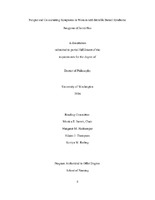| dc.description.abstract | <p>Irritable bowel syndrome (IBS) is one of the most common bowel disorders. It is characterized by symptoms of abdominal discomfort or pain that are associated with changes in bowel habits such as diarrhea or constipation. However, fatigue is also common disabling symptom seen in patients with IBS. Fatigue frequently co-occurs with abdominal pain and psychological distress (i.e., depression and anxiety). Current management of fatigue for patients with IBS is difficult. It is a challenge to obtain clarity of separating fatigue from other cooccurring symptoms or the combinations of symptoms that come with fatigue. Because there are limited understanding of relationships among symptoms, and patient characteristics including underlying mechanisms of symptom cluster of fatigue and co-occurring symptoms.</p>
<p>The aims of this dissertation study were: [First part of the dissertation study] 1. To explore the relationships among fatigue and co-occurring symptoms (i.e., abdominal pain, depression and anxiety). (1-a) the relationships between abdominal pain and fatigue; and (1-b) whether psychological distress (i.e., depression and anxiety) mediates the effect of abdominal pain on fatigue, across-women and within-woman; and [Second part of the dissertation study] 2. To determine (2-a) if latent classes (i.e. subgroups) of women with IBS could be identified based on the symptom cluster severity of fatigue, abdominal pain, depression and anxiety, (2-b) if these latent classes differed on patient characteristics, and (2-c) if genetic polymorphisms of tryptophan hydroxylase (TPH), serotonin reuptake transporter (SERT) and catecholamine methyl-O-transferase (COMT) are associated with fatigue, and (2-d) with latent class membership.</p>
<p>A secondary analysis of baseline data were conducted from two previous randomized controlled trials of a nurse-delivered symptom intervention. Study participants, Caucasian women with IBS, completed an initial interview, questionnaires, and kept a daily symptom diary for 28 days. For the first part of the dissertation, the relationships among daily diary fatigue, abdominal pain, and psychological distress were tested using a generalized estimating equation (GEE). For the second part of the dissertation, the latent class profile analysis (LCPA) was used to determine the latent classes, and analysis of variance/Chi-square test were used for testing group differences in patient characteristics and genetic polymorphisms. Buffy coat deoxyribonucleic-acid was analyzed by polymerase chain reaction for genetic analysis. For the first part of the dissertation study, we found that fatigue, abdominal pain and psychological distress were positively related with each other as a symptom cluster. The positive and significant across-women relationships were observed between abdominal pain and fatigue. Abdominal pain predicted next-day fatigue within-woman, but not in the reverse. Psychological distress significantly mediated the effects of abdominal pain on fatigue across-women and within-woman. For the second part of the dissertation study, three latent classes were identified (Class-1, low severity; Class-2, medium severity; Class-3, high severity). Women in the high severity class had a lower social support, higher symptom burden (in particular poor sleep quality and high stress level), a poorer quality of life (QOL), and higher life interferences. The TT genotype of TPH2 rs4570625 was positively associated with fatigue (p</p>
<p>Future studies are needed to 1) measure symptoms at different time points for better understanding of the relationships among symptoms; 2) further explore fatigue mechanisms; 3) develop fatigue management interventions, incorporating multiple factors such as social support, sleep quality, stress, QOL and genetic factors; and 4) replication findings in different populations and ethnic groups.</p> | en |





